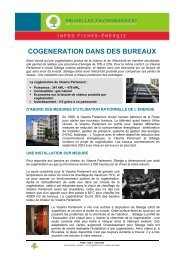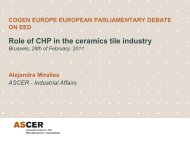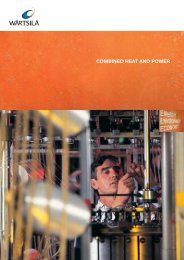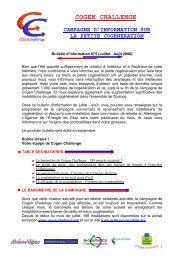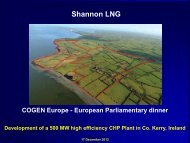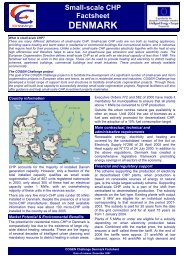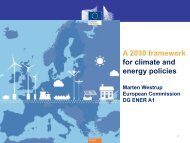Jean-Philippe Perrot, Solvay - COGEN Europe
Jean-Philippe Perrot, Solvay - COGEN Europe
Jean-Philippe Perrot, Solvay - COGEN Europe
Create successful ePaper yourself
Turn your PDF publications into a flip-book with our unique Google optimized e-Paper software.
<strong>Europe</strong>an Union 11-15 April 2011<br />
Sustainable Energy Week<br />
The use of cogeneration in <strong>Europe</strong>an<br />
key industry sectors<br />
Cefic strategy and best practice example in<br />
the chemical sector<br />
<strong>Jean</strong>-<strong>Philippe</strong> <strong>Perrot</strong>, <strong>Solvay</strong><br />
14 April 2011<br />
EUROPEAN<br />
COMMISSION
Communication of Commissioner<br />
Oettinger “Energy 2020 strategy”<br />
Add your<br />
logo here<br />
• A strategy for competitive, sustainable and secure energy<br />
– One of the five priorities<br />
• Achieving an energy efficient <strong>Europe</strong><br />
– Reinforcing efficiency in energy supply<br />
» Increase the uptake of high efficiency cogeneration<br />
<strong>Europe</strong>an Union 11-15 April 2011<br />
Sustainable Energy Week<br />
EUROPEAN<br />
COMMISSION<br />
2
Why energy matters for us!<br />
Add your<br />
logo here<br />
• Energy policies matter to the EU chemicals industry: we<br />
account for 12% of total EU energy demand and for one third<br />
of all EU industrial energy use (energy and feedstock): With<br />
base chemicals, energy and feedstock together frequently<br />
exceed 50% of total production cost.<br />
• Energy efficiency is a core competence: The EU chemical<br />
industry has decreased energy intensity by 4.0% per year<br />
on average since 1995 and overall by 41% since 2003:<br />
energy efficiency is making us globally competitive.<br />
<strong>Europe</strong>an Union 11-15 April 2011<br />
Sustainable Energy Week<br />
EUROPEAN<br />
COMMISSION<br />
3
The chemical industry has improved<br />
energy and GHG efficiency<br />
Add your<br />
logo here<br />
Over the last<br />
17 years the<br />
chemical<br />
industry has<br />
increased its<br />
output and at<br />
the same time<br />
kept energy<br />
input constant:<br />
consequently<br />
its energy<br />
intensity<br />
decreased by<br />
4.6% per year<br />
on average.<br />
<strong>Europe</strong>an Union 11-15 April 2011<br />
Sustainable Energy Week<br />
4<br />
EUROPEAN<br />
COMMISSION
Energy efficiency improvements<br />
throughout society needed<br />
Add your<br />
logo here<br />
• Cefic supports initiatives towards energy efficiency<br />
improvements:<br />
– Voluntary proactive industry measures in past 20 years<br />
– EU project under the Intelligent Energy for <strong>Europe</strong> programme (“CARE +”)<br />
• Energy efficiency improvements throughout society and in all<br />
sectors needed:<br />
– In particular in Non-ETS sectors such as transport and building (largest<br />
increase in emissions over the last few years), e.g. through better insulation<br />
in buildings<br />
The chemical industry is key for EU economic development and wealth,<br />
providing modern, efficient products and materials and enabling technical<br />
solutions i.e. energy efficiency in virtually all sectors of the economy<br />
<strong>Europe</strong>an Union 11-15 April 2011<br />
Sustainable Energy Week<br />
EUROPEAN<br />
COMMISSION<br />
5
Caution with EU binding<br />
efficiency targets<br />
Add your<br />
logo here<br />
• BUT caution with EU economy-wide efficiency<br />
targets (no measuring method):<br />
– Increased energy efficiency must not be confused with simply<br />
capping absolute EU energy consumption: such a cap would risk<br />
distorting prospects for EU investment in infrastructure and<br />
manufacturing plants, driving such investments outside <strong>Europe</strong>.<br />
– Danger of adding administrative burdens and double regulation:<br />
e.g. avoid overlap with other measures like EU ETS, which<br />
covers most of the chemical sector’s emissions.<br />
– Instead introduction of tax incentives, combined with voluntary<br />
sector initiatives as more effective drivers of energy efficiency.<br />
<strong>Europe</strong>an Union 11-15 April 2011<br />
Sustainable Energy Week<br />
EUROPEAN<br />
COMMISSION<br />
6
Cogeneration is essential for the<br />
chemical industry<br />
Add your<br />
logo here<br />
• First objective : to produce heat<br />
• Second objective : to improve energy efficiency<br />
• The cogeneration benefits are :<br />
– Primary energy savings (5 to 20 %) compared to separate production of<br />
heat and electricity<br />
– Greenhouse gases emission reductions (5 to 30 %)<br />
– Security of energy supply for the site<br />
– Electrical network losses avoidance (1.5 to 7.5 %)<br />
<strong>Europe</strong>an Union 11-15 April 2011<br />
Sustainable Energy Week<br />
EUROPEAN<br />
COMMISSION<br />
7
Industrial cogeneration specificity<br />
Add your<br />
logo here<br />
• <strong>Solvay</strong> is using both gas and coal-fired cogeneration<br />
• <strong>Solvay</strong> has built in partnership 900 MWe of gas-fired<br />
cogeneration from 1995 to 2002<br />
• <strong>Solvay</strong> has still an untapped potential for developing<br />
cogeneration units in <strong>Europe</strong>, but no project on-going<br />
– Unfavourable <strong>Europe</strong>an regulation<br />
– Current national support scheme not sufficient<br />
<strong>Europe</strong>an Union 11-15 April 2011<br />
Sustainable Energy Week<br />
EUROPEAN<br />
COMMISSION<br />
8
<strong>Solvay</strong> and the use of cogeneration<br />
Add your<br />
logo here<br />
• The duality industrial/district heating cogeneration<br />
– District heating<br />
• Heat demand mainly in winter during cold weather (heating temperature is also<br />
reduced for night)<br />
• High national electricity demand during cold weather (high electricity market price)<br />
‣ Good valorisation of produced electricity when heat is produced<br />
– Chemical processes<br />
• Continuous heat demand (all the year long)<br />
• No correlation between national electricity demand and industrial heat demand<br />
‣ Low valorisation of produced electricity when heat is produced during off-peak hours<br />
• Industrial cogeneration need to be competitive<br />
– An additional financial support compared to district heating cogeneration<br />
– a Taylor made support scheme where production of heat is the main driver<br />
<strong>Europe</strong>an Union 11-15 April 2011<br />
Sustainable Energy Week<br />
EUROPEAN<br />
COMMISSION<br />
9
<strong>Europe</strong>an regulation: ETS<br />
Add your<br />
logo here<br />
• Is the Emission Trading Scheme Directive supporting cogeneration ?<br />
– Unfavourable treatment for cogeneration compared to classical boiler<br />
• Article 10.a.4 : free allocations related to high efficiency CHP are adjusted by<br />
1.74 % per year<br />
– ETS Directive should be amended?<br />
<strong>Europe</strong>an Union 11-15 April 2011<br />
Sustainable Energy Week<br />
EUROPEAN<br />
COMMISSION<br />
10
<strong>Europe</strong>an regulation: IED<br />
Add your<br />
logo here<br />
• Is the Industrial Emission Directive supporting cogeneration ?<br />
– Unfavourable treatment for cogeneration compared to district heating<br />
plants<br />
• Article 35 : District heating plants have a longer delay (up to 2023) than<br />
cogeneration (up to 2016) for applying new Emissions Limit Values<br />
– Article 32 : Transitional National Plan should exempt from compliance<br />
with ELV cogeneration till 2020<br />
<strong>Europe</strong>an Union 11-15 April 2011<br />
Sustainable Energy Week<br />
EUROPEAN<br />
COMMISSION<br />
11
<strong>Europe</strong>an regulation: 3 rd package<br />
Add your<br />
logo here<br />
• Are electricity and gas market liberalisation Directives supporting<br />
cogeneration ?<br />
– As a stand alone electricity producer penalties in case of imbalance on<br />
electrical and natural gas networks are entirely borne by the<br />
cogeneration operator<br />
– Gas and power exchange accessibility costs are disproportionate for a<br />
stand alone CHP<br />
• Give to industrial operators the possibility to additionally subscribe long term<br />
energy contracts<br />
– For new project connection to the electrical grid financed by the<br />
cogeneration operator<br />
• Cogeneration should benefit for the grid connection from the same<br />
conditions as for renewable energy sources (e.g. windmills…)<br />
<strong>Europe</strong>an Union 11-15 April 2011<br />
Sustainable Energy Week<br />
EUROPEAN<br />
COMMISSION<br />
12
<strong>Europe</strong>an regulation: Taxation<br />
Add your<br />
logo here<br />
• Is Energy Taxation Directive supporting cogeneration ?<br />
– Member states may apply total or partial reductions in the level of<br />
energy consumption taxation to<br />
• Energy products and electricity used for combined heat and power<br />
generation<br />
• Electricity produced from high efficiency CHP<br />
– Article 15 should be amended : “Member States shall apply…”<br />
<strong>Europe</strong>an Union 11-15 April 2011<br />
Sustainable Energy Week<br />
EUROPEAN<br />
COMMISSION<br />
13
Conclusions<br />
Add your<br />
logo here<br />
• The new <strong>Europe</strong>an cogeneration Directive should<br />
– Make sure to extend support scheme of existing cogenerations<br />
– Improve the promotion of cogeneration<br />
– Delete the current technical and economical obstacles which prevent a<br />
smooth development of cogeneration<br />
– Create a stable long term promotion mechanism<br />
– Create a stable administrative environment in the implementation phase<br />
– Have a stable legal framework during the whole economical life of the units<br />
– Promote National Transition Plan of IE Directive to exempt from compliance<br />
with ELV cogeneration till 2020 instead of 2016<br />
To properly address these complex challenges the new<br />
<strong>Europe</strong>an cogeneration Directive should not be combined with<br />
the energy saving directive but remain separate<br />
<strong>Europe</strong>an Union 11-15 April 2011<br />
Sustainable Energy Week<br />
EUROPEAN<br />
COMMISSION



